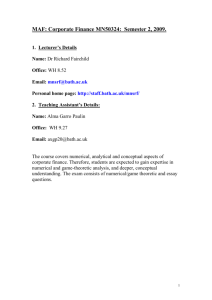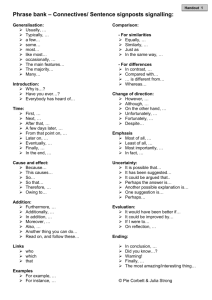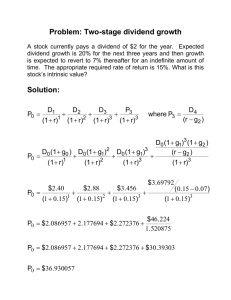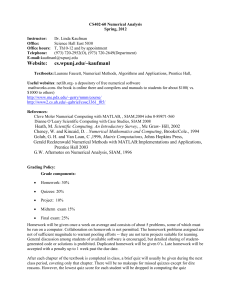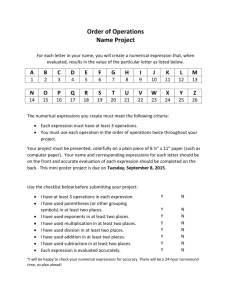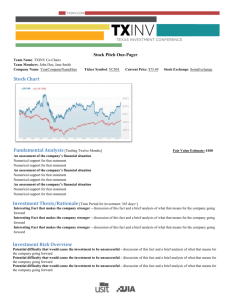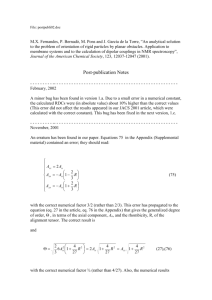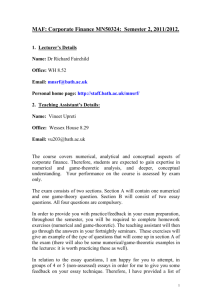Advanced Company Finance
advertisement
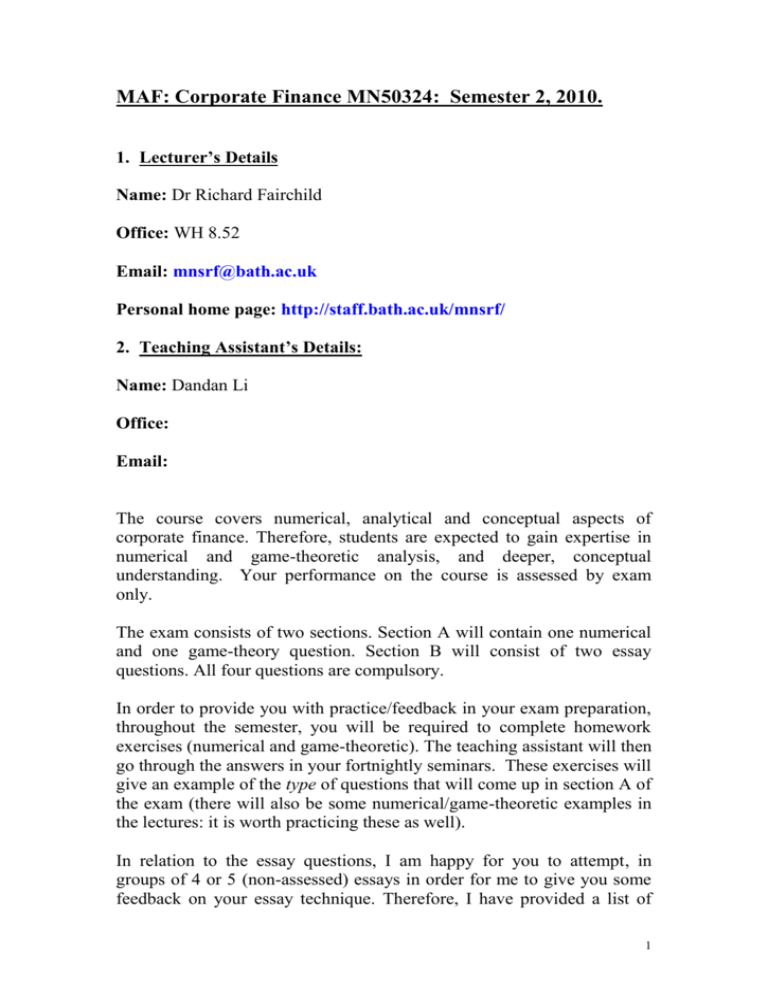
MAF: Corporate Finance MN50324: Semester 2, 2010. 1. Lecturer’s Details Name: Dr Richard Fairchild Office: WH 8.52 Email: mnsrf@bath.ac.uk Personal home page: http://staff.bath.ac.uk/mnsrf/ 2. Teaching Assistant’s Details: Name: Dandan Li Office: Email: The course covers numerical, analytical and conceptual aspects of corporate finance. Therefore, students are expected to gain expertise in numerical and game-theoretic analysis, and deeper, conceptual understanding. Your performance on the course is assessed by exam only. The exam consists of two sections. Section A will contain one numerical and one game-theory question. Section B will consist of two essay questions. All four questions are compulsory. In order to provide you with practice/feedback in your exam preparation, throughout the semester, you will be required to complete homework exercises (numerical and game-theoretic). The teaching assistant will then go through the answers in your fortnightly seminars. These exercises will give an example of the type of questions that will come up in section A of the exam (there will also be some numerical/game-theoretic examples in the lectures: it is worth practicing these as well). In relation to the essay questions, I am happy for you to attempt, in groups of 4 or 5 (non-assessed) essays in order for me to give you some feedback on your essay technique. Therefore, I have provided a list of 1 typical essay questions that have appeared in previous years’ exams. For instance: 1. “The firm must understand that investing in a project is a now-ornever decision.” Discuss, with particular reference to real option theory. 2. “The firm’s capital structure is irrelevant.” Discuss. 3. Compare and contrast the trade-off and pecking order theories of capital structure. 4. “Our firm needs to cut the dividend this year, as we have a lot of exciting new investment projects available!” Discuss the dangers inherent in doing this, and how the firm should handle such a policy. 5. A firm is deciding whether to use its excess cashflow to pay dividends or repurchase shares. Does it matter which it does? In your answer, refer to the relevant theories, and the empirical evidence. 6. “Our firm should an active takeover policy, as this will greatly enhance our shareholders’ wealth.” Discuss this, with reference to relevant theory.” 7. “When negotiating contracts with entrepreneurs, venture capitalists must be aware of the potential for entrepreneurial opportunistic behaviour.” Discuss, with reference to relevant theory and evidence.” (maximum 3000 words). 2 3. Course Outline: Topic 1. Investment Appraisal, decision trees. Real options 2. Information Asymmetry/agency theory 3. Capital Structure and Firm Value/Optimal Capital Structure. 4. Payout Policy (Dividends/repurchases. 5. Mergers and acquisitions. 6. Convertible Debt 7. Efficient Markets and Corporate News 8. Venture Capital/Private Equity 9. Behavioural Corporate Finance Relevant Chapters Relevant in CWS chapters HRWJJ 9 in 4, 6, 7, 8, 22 12 15 15, 16 16 18 18 24 13 Not applicable: but see papers below Textbook by Hersch Shefrin 4. Reading List Recommended Books: 1. Financial Theory and Corporate Policy: Copeland, Weston, Shastri. 2. Corporate Finance (European Edition): Hillier, Ross, Westerfield, Jaffe and Jordan. Besides these books, I thoroughly recommend the following suggested reading: Behavioural Corporate Finance by Hersch Shefrin (available from Amazon etc). 3 6 Roundtable Discussions of Corporate Finance Editor Joel Stern (Available in the library). Revolution in Corporate Finance (3rd Edition preferred, but 4th edition also available) Stern and Chew editors (available in the library). Dividend Policy: its Impact on Firm Value: Lease et al (I have a copy!). You do not have to purchase any of these, but they will help you to research the subject beyond the lectures, and deepen your understanding of the issues in Corporate Finance. Please note that the text-books support (and are complementary to) the lecture slides. That is, the lectures do not follow the text-book exactly. The lectures cover material beyond the text-books (such as journal articles). It is up to the student to read/research beyond the text-book and the lectures (eg read the articles, use Google, SSRN and the financial press. Furthermore, if RWJ is unavailable to you, the library has a whole host of alternative corporate finance books around the 658.15 reference. They all cover similar topics. In addition to the chapters of CWS, and RWJ identified above, you will enhance your understanding of the course by reading relevant, recommended research articles. Initially, I am providing an article list for the first couple of topics. I will add articles for the other topics throughout the course. General Corporate Finance articles: “The theory and practice of corporate finance: Evidence from the field” , Graham and Harvey, Journal of Financial Economics, 2001. “Payout Policy in the 21st Century”, Graham, Harvey, and Michaely., Journal of Financial Economics 2005. 1. Investment Appraisal /Decision Trees/real options. Suggested Readings: “Real Options and Games: Competition, alliances and other applications of valuation and strategy.” Smit, H, and L. Trigeorgis. Review of Financial Economics 15 (2006); 95-112. “A Two-stage Investment Game in Real Option Analysis.” Imai, J, and T. Watanabe. Downloadable from Google. 4 “A Real Options and Game-Theoretic Approach to Corporate Investment Strategy under Competition.” Smit and Ankum. (1993). Financial Management. “Sunk Costs, Uncertainty and Market Exit: a real Options perspective.” O’Brien and Folta, Industrial and Corporate Change, 2009. 2. The Financing Decision/ Optimal Capital Structure, Agency Costs, Signalling. Jensen and Meckling. “Theory of the Firm: Managerial Behavior, Agency Costs, and Ownership structure.” Journal of Financial Economics, October 1976, 305-360. Jensen. “Agency Costs of Free Cashflow, Corporate Finance and Takeovers.” American Economic Review. May 1986. Myers and Majluf. “Corporate Financing and Investment Decisions when Firms Have Information that Investors do not have.” Journal of Financial Economics November 1977, 147 – 176. Ross. S.A. “The Determinants of Financial Structure: The Incentive Signalling Approach.” Bell Journal of Economics Spring 1977, 23 – 40. Harris and Raviv. “The Theory of Capital Structure.” Pg 297-355 Journal of Finance 1991. “An investigation of the determinants of BT’s debt levels: what does it tell us about the optimal capital structure?” Fairchild, R. International Business and Economics research Journal. Paper downloadable from Bath Working paper series. 3. Capital Structure and Corporate Control in Emerging economies: Bebchuk, L: “A Rent-protection theory of Corporate Ownership and Control.” NBER Working papers. 1999 Fairchild, R, and, Alma Garro Paulin. (2007) “Separation of Control Rights and Cashflow Rights in Emerging Economies: Theory and Mexican Evidence.” Corporate Ownership and Control 2007. 4. Payout Policy: a) Dividend/share repurchase Policy. 5 Fairchild, R. (2010): “Dividend Policy, Signalling and Free-cashflow: an Integrated Approach.” Managerial Finance Vol 36 issue 5, Forthcoming (downloadable). Fairchild (2006) “When Do Share Repurchases Increase Shareholder Wealth?” Journal of Applied Finance Spring/Summer. McNally, W.J. “Open Market Stock Repurchase Signalling.” SSRN. Bhattacharya, U. and A. Dittmar. “Costless Versus Costly Signalling: Theory and Evidence from Share Repurchases.” SSRN. Isagawa, N. (2000) “Open-market Stock Repurchase and Stock price Behavior when Management Values Real Investment.” Financial Review; pp 95 – 108. Isagawa, N. (2002) “Open-market repurchase announcements and stock price behaviour in inefficient markets.” Financial Management pp 5 – 20. Weston and Siu. (2003) “Changing Motives for Share Repurchases.” SSRN database. Seminars: Class Exercises. In addition to the lectures, there will be weekly seminars (run by teaching assistant Dandan Li). These will commence in week 19 (week beginning 8th February). In the exam, there will be an essay section, and a numerical/analytical section. The analytical section consists of a numerical question, and a game-theoretic question. Throughout the course, you will receive exercises to do in your own time (these will provide good practice for the sort of questions that may arise in the numerical/game theoretic section of the Summer Exam). In the seminars, Dandan will work through the answers. 6 Each of you will attend fortnightly seminars. Your exercise schedule is as follows: Week 20/21 22/23 24/25 28/29 30/31 Class Exercise Decision Tree exercise/real options game theoretic exercise. Capital Structure Exercise 1 and Debt Signalling Game Dividend Signalling game. M and A exercise. Venture Capital Game/ Behavioural Corporate Finance: debt signalling game with overconfidence. 7
